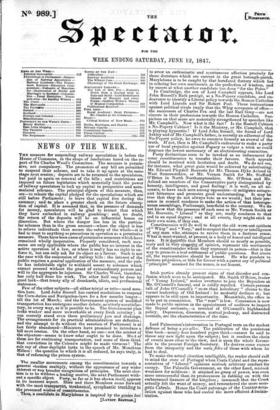The smaller movements among the constituencies towards a general election
multiply, without the appearance of any wider interest or any broader recognition of principles. The next elec- tion is to be without a leading motive, the next Parliament with- out a specific object. Party, so far as it has shown itself, appears in its meanest aspect. Here and there Members come forward with the most transparent, mechanical, sycophantic truckling to the presumed wishes of constituencies. Thus, a candidate in Marylebone is inspired by the genius loci [LATEST EDITION.]
to avow an enthusiastic and spontaneous affection precisely for those doctrines which are current in the great borough-parish. Marylebone is to be caught by that barefaced flattery which lies in echoing her own sentiments as the perfection of wisdom, and by sneers at what another candidate has done " for the Poles."
In Cambridge, the son of Lord Campbell appears, like Lord John Russell's Bath protégé, as a No-Popery candidate, and en- deavours to identify a Liberal policy towards the Roman Catholics with Lord Lincoln and Sir Robert Peel. These insinuations against political rivals imply that the Whig occupants of office— the successors of Charles Fox and the last Earl Grey—are not sincere in their professions towards the Roman Catholics. Sus- picions on that score are materially strengthened by speeches like Mr. Campbell's. Now what is the fact ? Is the Russell Cabinet a No-Popery Cabinet? Is it the Ministry, or Mr. Campbell, that is playing hypocrite? If Lord John Russell, the friend of Lord Ashley and of Mr. Campbell's father, is secretly an adherent of the No-Popery policy, he owes to common, honesty an avowal of the truth. If not, then is Mr. Campbell's endeavour to make a party use of local prejudice against Papacy as vulgar a trick as could disgrace the lowest mercenary of an electioneering committee. Party distinctions seem to be invoked as an inducement for some constituencies to transfer their favours. Such appeals should be received with hesitation and doubt. We do not see, for instance, what great gain would be achieved by substituting, Mr. Edward Pleydell Bouverie for Mr. Thomas Dyke Acland in West Somersetshire, or Mr. Vernon Smith for Mr. Stafford O'Brien in North Northamptonshire. Mr. O'Brien and Mr. Acland are members of the Conservative party distinguished by honesty, intelligence, and good feeling: it is well, on all ac- counts, to have such men among opponents—it mitigates antago- nist bitterness and promotes good understanding. It may be true that they do not always vote as we would; but their pre- sence in council conduces to make the action of that heteroge- neous assemblage, Parliament, beneficial to the country. We do not know that the presence of such men as Mr. Vernon Smith or Mr. Bouverie, " Liberal " as they are, really conduces to that end in an equal degree ; and at all events, they might stick to their own seats, if they can. Constituencies will do well to forget the old worn-out epithets of " Whig" and " Tory," and to suspect the honesty or intelligence of anyman who: attempts to revive them in a factious sense. What is most wanted, at present, is a body of honest and intelligent men. It fe:clesirtible that Members should as nearly as possible, truly and in vIry sinfprity of opinion, represent the sentiments of the constituencies whom they represent in person—that is the way to promote a real settlement of public questions. But above all, the representative should be honest. He who panders to factious prejudices, or bids for favour with a parrot cry of political "principles " assumed for the nonce, is not honest.


























